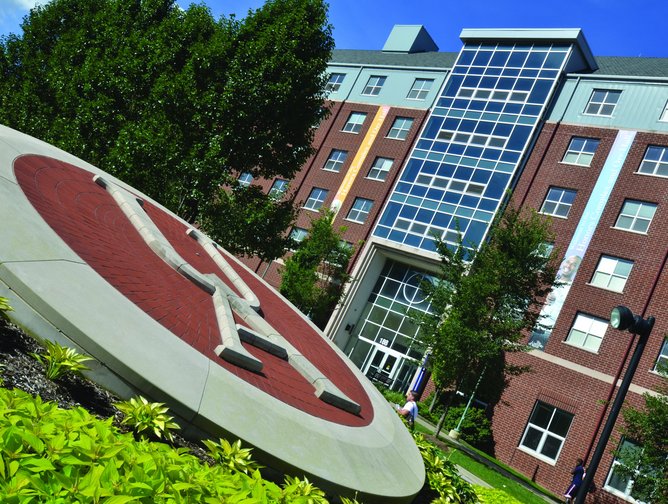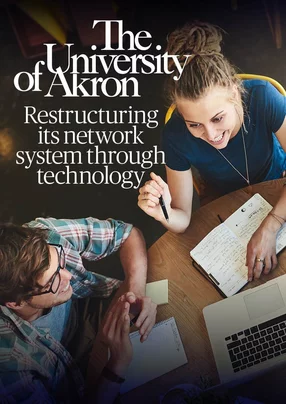Undergoing a digital transformation to implement new network systems at The University of Akron
With organizations worldwide embracing technology to make day-to-day operations easier, it has become vital to adapt to the latest digital trends in order to stay current. In the midst of a significant digital transformation in the United States (US), The University of Akron has put a substantial emphasis on technology as the organization looks to restructure its entire network system.
Overseeing the upgrade of the digital enhancements at The University of Akron is John Corby, Chief Information Officer (CIO), who has worked in a variety of different roles such as Project Management Officer and Senior Director of Enterprise Applications and Business Intelligence, since arriving in 2005. Now CIO, Corby believes the university has evolved considerably in comparison to when he first joined due to the ever-increasing influence technology has had on operations. “When I first came here, technology had a very limited role and was primarily transactional in nature and was benignly accepted by those who used it. Today, it’s completely embedded into everything students, faculty or staff do and is now an expectation. No one comes to the campus without being touched by technology. It does mean that change management, training and communications are critical as we continue to introduce technology and change,” explains Corby. “The management of technology has shifted from large-scale initiatives to a continuously reoccurring process. The process to provide new client-based equipment for faculty and staff and the replacement of our network and server technology has all shifted from large-scale and costly implementations to a cost of doing business. Technology isn’t going away and we need to do a better and more cost-effective job in supporting, replacing and expanding the technology we offer.”
Embracing technology
As one of the first universities in the US to go wireless, The University of Akron is currently halfway through a complete upgrade to replace its network technology at the university. The organization is also undergoing a major security upgrade, both physically and digitally, to expand the security-related infrastructure at the university. “Digitally we have moved forward with the implementation of advanced security features with our Office 365 products. We’re also moving forward with multi-factor authentication and eventually with a new identity management system. It has been a challenge to balance the need to protect our systems without making it too onerous or complicated for our students, faculty and staff to get access to the systems and technology they need,” says Corby. “With physical safety being a key consideration for our campus, we are in the midst of an upgrade and expansion of the infrastructure that supports this. We’re in the early stages of an upgrade and expansion of our video surveillance infrastructure and recently converted our radio technology. The jump from analog to digital technology has been a great improvement in the sophistication and efficiency of our support for these operations.”
With the university halfway through upgrading the entire network system, Corby believes the process has been more seamless than expected. “The process has gone along much smoother than I anticipated. It was a complete technology switch for us migrating from a well-established solution to one that was completely new to the university and the network staff who implemented and maintained it,” he says. “We’re almost done with our wired network upgrade which presented challenges in supporting the old network infrastructure while implementing the new infrastructure alongside it without impacting the network access provided to our campus. Interestingly, we used some student employees who were taking some network-related classes to help with the implementation of the wireless technology. This provided some real-life “labwork” for the students and helped us rapidly deploy our new technology.”
Forming key relationships
In order to help achieve its success, The University of Akron has formed a key technology partnership with Oracle to push the organization’s digital output. The university utilizes Oracle technologies for its ERP, data warehouse, enterprise databases, storage and has recently started using Analytics Cloud (OAC) services to move forward with the organization’s business intelligence and analytics initiatives. With the help of Oracle, the university has migrated to Oracle Database Appliances (ODA) along with RAC and Active Dataguard for sustainability allowing access to systems and servers 24/7. “The ODA has provided the resiliency and business continuity that we did not have before these were put in place. They have been invaluable in regards to providing a reliable and uninterrupted user experience for our students, faculty and staff,” explains Corby. “This technology has really helped to reduce the amount of time and effort to maintain our enterprise databases which has been critical given the reduction in staff that has occurred. For example, clones of our databases are completed in just a few hours where it had previously taken days to complete.”
The university has also established technology partnerships with Dell and Blue Chip Consulting and Corby believes these key relationships have been pivotal to the expansion of the technology that the organization has implemented. “Dell has been another key technology partner for the University and helps to supply much of our infrastructure needs including servers, storage and our wired network,” he says. “We recently leveraged a state agreement to use Dell as our reseller for Microsoft products. In addition, Blue Chip Consulting is a local firm but one who has really helped us expand the use of technologies we weren’t able to leverage before. We’ve used them recently to help us with the implementation of advanced security functionality provided with our Office 365 product.”
Looking to the future, Corby affirms it remains of high importance that the university continues to sustain its success by continuing to make progress digitally. “It’s important that we sustain the efforts to enhance our network, provide reliable access to our digital assets and ensure the safety of our digital and physical resources. We need to ensure that there are no barriers to our success and we must continue to utilize data to make more informed and impactful decisions.”





- Top 100 Women 2024: Tanja Rueckert, Bosch - No. 6Digital Transformation
- Coforge: Arming Financial Firms with the Tools to InnovateDigital Transformation
- Coforge: Arming Financial Firms with the Tools to InnovateDigital Transformation
- MWC24: Harnessing AI to Modernise Telcos with Tech MahindraDigital Transformation

